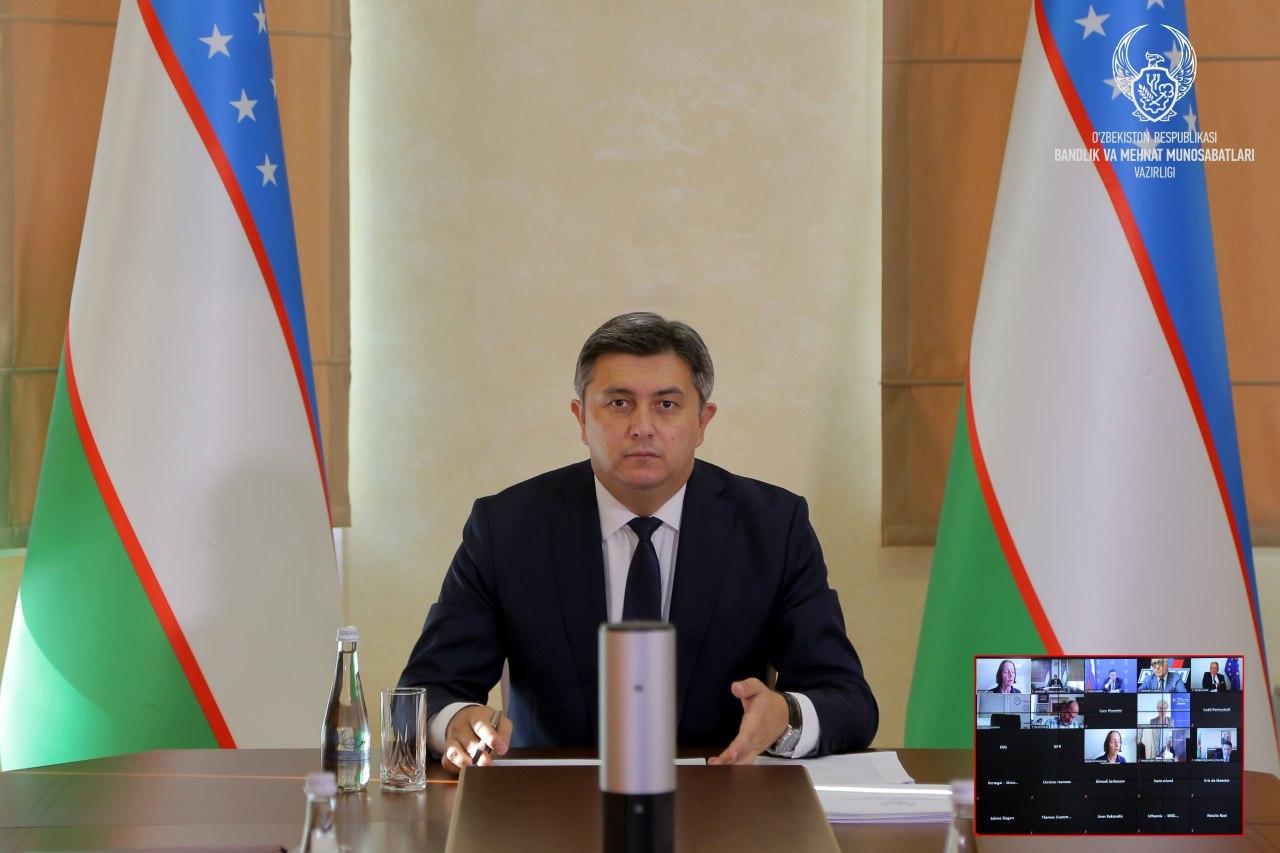
The Government portal of the
Republic of Uzbekistan
Coronavirus and the labor market: Uzbekistan and European countries exchanged experience in countering the pandemic
2020-07-03 | Society
On July 1, the ILO Global Summit hosted a Regional session for Europe and Central Asia to discuss the impact of the coronavirus pandemic on labour markets.

The online meeting was attended by Ministers of labor and heads of organizations of employees and employers of countries such as Switzerland, Sweden, Portugal, Belgium, Croatia, Spain, Russia, Georgia and others. The Central Asian region was represented by the Minister of employment and labor relations of Uzbekistan, Nozim Khusanov, who introduced participants to local experience in dealing with the consequences of the pandemic on the country's labor market.
Opening the meeting, ILO Director General Guy Ryder noted that "exactly a year ago, the international labour organization celebrated its 100th anniversary, taking a course for a better sphere of work, at the center of which is the person and his right to decent work." "This people - oriented approach should remain our beacon in the future," Guy Ryder said in his message to the participants of the meeting.
Heinz Koller, regional Director of the International labour office for Europe and Central Asia, noting the importance of a three-way dialogue between Governments, employers 'and workers' organizations, stressed that in order to find common solutions to the Covid-19 pandemic and its impact on the labour market, the Summit brought together ILO's three-way partners "from Lisbon to Tashkent, from Vilnius to Malta".
According to ILO estimates, in the Europe and Central Asia region, 3% of working time (equivalent to 12 million full-time jobs) was lost in the first quarter of 2020, and up to 12.9% of working time (equivalent to 50 million full-time jobs) may be lost by the end of the second quarter. In this regard, the international community is making a collective effort to combat the devastating effects of the pandemic on people, as well as on the economy and society. "Everyone found themselves in an unexpected and unprecedented situation, which is a difficult challenge for governments, social partners and international organizations that have an incredible responsibility for the lives and fate of millions of people," said H. Koller, presenting a regional view of the world of work in the current context of the COVID - 19 pandemic.
During the panel discussions, representatives of countries in the region presented the country context of measures taken to support and stimulate the labor market during the pandemic.
Presenting the experience of Uzbekistan, the Minister of employment and labor relations N. Khusanov informed the participants of the Summit in detail about the large-scale anti-crisis measures taken by the Government under the leadership of President Sh. M. Mirziyoyev in order to stimulate employment, preserve jobs and incomes of workers, ensure safety and health in the workplace, prevent discrimination and social exclusion.
Noted that, with ILO support, the Ministry conducted a study on the impact COVID-19 to the labour market, and now the results of the surveys we can say that the crisis has had a very strong negative impact on the employment of workers in several key sectors of the economy (services, construction, etc.), particularly vulnerable youth and women, mostly engaged in small business.
The anti-crisis measures adopted by Uzbekistan fully comply with the four main principles of the ILO on combating the pandemic, i.e. they are aimed at stimulating the economy and employment, supporting enterprises, jobs and incomes, protecting workers in the workplace, and social dialogue. At the initiative of the President, an Anti-Crisis Fund was created in the amount of 10 trillion sum and the Charity and Support Fund for poor families.
In addition, the Government has approved a temporary order to provide employment for family members whose social status and standard of living have deteriorated in the context of the coronavirus pandemic. The Fund of public works for temporary employment employed about 230 thousand unemployed; more than 33 thousand families provided through the mechanism of subsidizing low-income families on the development of household plots and the creation of agricultural cooperatives; 3 thousand unemployed people were employed through subsidies for the development of entrepreneurship among the population; 20 thousand the unemployed received unemployment benefits. Thus, 374 thousand citizens are provided with employment and permanent income for three months of work.
In his speech, Nozim Khusanov separately focused on the measures taken to protect workers in the workplace. First of all, the State labor inspectorate of labor together with the epidemiological service has established a system of monitoring of health and safety standards at enterprises.
To date, monitoring groups of labor inspectors have visited 5,757 enterprises and 892 of them have revealed violations of labor safety and health standards. For each individual case, the Inspectors gave recommendations on how to eliminate the existing shortcomings.
The coronavirus pandemic also showed the need for a qualitative review of the current Law "On labor protection". The regulatory framework should ensure maximum protection and decent working conditions for employees in accordance with the requirements of the current situation and international standards. Minister of employment and labor relations N. Khusanov expressed hope for cooperation with the ILO in the development of a new law "On labor protection".
During the pandemic, issues of wrongful dismissals became acute, and refusals to pay wages and maternity benefits became more frequent. During the COVID-2019 pandemic, the State labor inspectorate considered 8.2 thousand complaints from citizens regarding violations of labor laws and discrimination in the workplace, including 3 thousand appeals from women. According to the results of inspections, 3.6 thousand citizens, including 1.2 thousand women, have their labor rights restored.
Many companies and enterprises have adapted their activities to the conditions of quarantine and restrictive measures by switching to remote operation. In order to ensure the correct transition and compliance with all standards, the Ministry of labor has developed and implemented a "Regulation on the temporary procedure for transferring employees to work remotely".
Uzbekistan will continue to implement international labour standards in its legislation to ensure the rule of law, gender equality, and the protection of workers ' rights and freedoms in all sectors of economic activity.
In 2019 Uzbekistan is the only Central Asian country to have ratified the Protocol to the ILO forced labour Convention No. 29. Three more ILO conventions were also ratified: No. 144 "On tripartite consultations", No. 129 "On labour inspection in agriculture", and No. 81 "On labour inspection in industry and trade", which allowed for enhanced monitoring of employment and labour in these areas.
At the moment preparatory works are underway for the ratification of three ILO Conventions: No. 17 "On workers' compensation for accidents in the production", №183 "About reviewing of the 1952 Convention on maternity protection", №187 "On the basics promoting occupational health and safety of labour".
Summarizing the results of the panel discussions, H. Koller stressed that in contrast to the financial crisis of 2008-2009, today's Governments are willing to allocate the appropriate scale of investment to provide decent working conditions for all.
"In this difficult period, the ILO centenary Declaration and the 2030 Agenda remain beacons for us. First of all, this is support for enterprises and protection of workers in the labor sphere," the Regional Director summed up.
Next week, discussions at the ILO Global Summit will continue at the level of high-level heads of state and government, representatives of international institutions and organizations.
Source: Ministry of Employment and Poverty Reduction of the Republic of Uzbekistan









